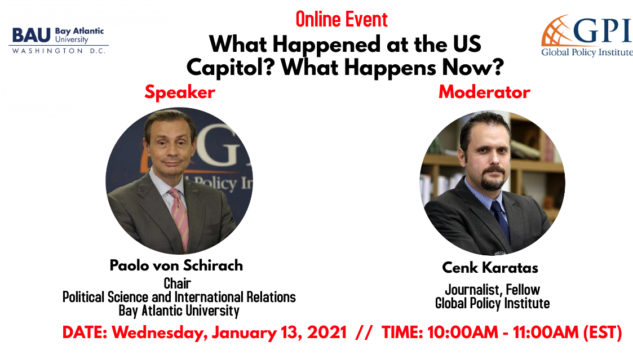Events

ONLINE EVENT: What Happened at the US Capitol? What Happens Now?
A divided America must heal the wounds caused by Trump
On January 13 the Global Policy Institute and Bay Atlantic University held a joint webinar titled:
What Happened at the US Capitol? What Happens Now?
The event had an interview format, with Cenk Karatas, Journalist and Global Policy Institute Fellow, in the role of moderator and interviewer and Paolo von Schirach, GPI President and Chair of Political Science and International Relations at Bay Atlantic University, answering questions.
Bitter political divisions and hard-fought campaigns are not uncommon in America. However, the aftermath of the November 3rd presidential elections created an unprecedented situation in which a defeated president refuses to admit the victory of his opponent using fabricated arguments about voters’ fraud. His efforts to avoid relinquishing power culminated in a rally in which he incited his followers to take over the US Capitol, the seat of the American Federal Legislature, as it was about to ratify the victory of his opponent. The effort to prevent this vote via the violent takeover of the Capitol failed. Come January 20, America will have a duly elected new President who will be sworn in strict compliance with the US Constitution. Still, much has happened. In the course of a lively exchange, Karatas and von Schirach examined the political, constitutional, and legal ramifications of this new and difficult situation.
Summary
To better understand the unprecedented violent riot leading to the illegal occupation on January 6 of the US Capitol, seat of the US Federal Legislature, we have to go back to the November 3 elections. They are unique. The losing candidate, Mr. Trump, refused to admit defeat. He did not concede, citing wild allegations of massive elections fraud that, in his opinion, deprived him of his victory. Since then, Mr. Trump mounted a major national campaign aimed at convincing his supporters that he won. At the same time, teams of lawyers working for his campaign mounted scores of legal actions in many states aimed at overturning the results of the elections. Despite the complete failure of all these legal actions and the eventual ratification of the vote by the election authorities in all 50 states, Mr. Trump continues to claim he won. Even after the formal announcement of the Biden victory in the course of the Electors meeting on December 14, Trump would not concede. In fact, he continued to use inflammatory language in his dialogue via tweets with his followers who completely believe the fantastic narrative of the stolen election. He urged them to come to Washington for a show of strength on January 6, the day in which a joint session of Congress was to ratify the election. The pro-Trump demonstration turned into the violent occupation of the US Capitol; a seditious riot aimed at subverting the normal constitutional process. It is clear that thousands of Trump supporters believed that they had his endorsement when they attacked the Capitol in order to stop the congressional vote that would ratify Biden’s victory.
This openly illegal attack, undertaken with the support of the President, caused a national outrage. Senior Republican law makers, for the very first time, condemned Trump in an open confrontation with many other Republicans in Congress who still support him, notwithstanding his role in the unprecedented attack on the Capitol. Going forward, the big issues are whether the Republican Party can be rebuilt after the Trump era, and whether President Biden will be able to be conciliatory and unite a deeply divided America, torn apart by the inability to agree on the truthfulness of simple facts.